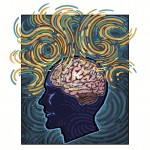Introduction
Comorbidity, or the co-occurrence of two distinct medical conditions, is a common phrase in both physical and mental health. Whilst the term was originally conceived to describe medical phenomena, the term was adopted by psychiatry in the description of more than one clinical presentation occurring simultaneously. However, its use in psychiatry is not without controversy.
What we know already
Large-scale prevalence data can seemingly tell us much about the high rate of comorbidity in mental health. Data from US National Comorbidity Survey, for example, suggested that, of those reporting mental health difficulties (across a 12-month prevalence), only 55% carried a single psychiatric diagnosis.
One important area of recent research concerns the rates of comorbidity of physical and mental health difficulties, particularly in the area of chronic health conditions. Mental Elf blogs have reported that people with schizophrenia are significantly more likely to die from heart disease and cancer; while the National Schizophrenia Audit calls for improved monitoring of physical health in people with schizophrenia. We know that depression and anxiety are more common when a person has a chronic health problem, and this comorbidity leads to poorer clinical and quality of life outcomes. This has led to an increase in interventions targeting the psychological consequences of chronic ill health.
Areas of uncertainty
The controversy in psychiatric comorbidity is the issues of mutual exclusivity. We are not able to conclude as to whether ‘comorbid’ psychiatric diagnoses are separate clinical entities, or multiple features of the same underlying cause. This has led to much criticism of the term ‘psychiatric comorbidity’.
Furthermore, certain diagnostic labels, such as personality disorders, attract particular scrutiny, due to their high levels of comorbidity with other mental health diagnoses. Similarly, people often meet the criteria for more than one personality disorder. This again creates uncertainty as to the precise nature of the condition, or conditions, being diagnosed.
What’s in the pipeline?
The recent publication of the Diagnostic and Statistic Manual (DSM)-5 seemingly retains the notion that multiple distinct clinical diagnoses exist, thus maintaining the argument for psychiatric comorbidity. Alternative conceptualisations have been suggested, along dimensional models, such as ‘anxious-misery’, ‘externalising’ and ‘fear-based’ dimensions. However, these were not adopted in the DSM-5.
As our understanding of mental health conditions continues to improve, so too hopefully will our understanding of comorbidity, and its relevance to psychological and psychiatric phenomena.
References
First, M. B. (2005). Mutually exclusive versus co-occurring diagnostic categories: the challenge of diagnostic comorbidity. Psychopathology, 38, 206-210. [Abstract]
Kessler, R. C., Chiu, W. T., Demler, O., & Walters, E. E. (2005). Prevalence, severity, and comorbidity of 12-month DSM-IV disorders in the National Comorbidity Survey Replication. Archives of general psychiatry, 62, 617-627. [Abstract]
Naylor, C., Parsonage, M., McDaid, D., Knapp, M., Fossey, M. and Galea, A. (2012) Long-term conditions and mental health: the cost of co-morbidities. The King’s Fund, London, UK. [Full text]
Acknowledgement
Written by: Patrick Kennedy-Williams
Reviewed by:
Last updated: Sep 2015
Review due: Sep 2016








